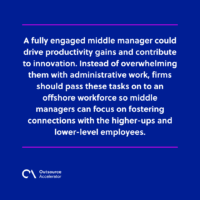Impending crisis
A looming middle manager crisis in 2025 could destabilize organizational structures if companies do not act now.
Everyone loves to dunk on middle management; however, new evidence suggests they’re a necessary – and now under threat – piece of the puzzle. Experts predict that by next year, burnout and inadequate support could lead to a “manager crash” that could adversely affect workforce productivity. They have likened this downturn to a market dive, where a leadership vacuum could curtail morale across all organizational levels.
Glassdoor data shows manager sentiment fell to its worst-ever levels earlier this year, as middle managers are “under pressure to do more with less.” Rising salary costs have prompted firms to treat department heads as catchalls. In their quest to have a lean workforce, businesses have starved their hierarchies to the bone by requiring their mid-level directors to handle mountains of administrative loads.
The effects have been disastrous. Rather than monitoring talent, improving productivity, and liaising with the C-suite and junior employees, they are swamped with administrative tasks, spending nearly one full day per week.
The glue
The middle manager connects executive demands with junior employee needs. They play a critical role in planning, organizing, and implementing strategy. They possess institutional knowledge and interpersonal skills and disseminate information across the corporate ladder.
Since hierarchical levels often have different goals and needs, middle managers need ample time to develop strategies and dialogue with the concerned branches of the organization. Think of them as the glue that keeps companies together, which has become more imperative in today’s hybrid work arrangements.
This suite of responsibilities makes the job challenging and rewarding enough. Assigning huge administrative loads to the job makes it volatile to burnout, which could lead to massive productivity dips across the organization.
Offshore teams
A fully engaged middle manager could drive productivity gains and contribute to innovation. Instead of overwhelming them with administrative work, firms should pass these tasks on to an offshore workforce so middle managers can focus on fostering connections with the higher-ups and lower-level employees.
Offshore professionals are the perfect collaborators corporations must use to assist their managers in various tasks such as database management, bookkeeping, internal communications, calendar management, and more.
Businesses on a financial binge should not worry about breaking their coffers, as these outsourced workers are available at a sweet 70% discount. An offshore workforce allows businesses to remain lean and hyperproductive simultaneously.
Outsourced professionals will not only alleviate the burden faced by middle managers but also maximize their strengths as the high tack glue that binds teams together.
The question for your business
Have you incorporated senior roles into your offshore teams?




 Independent
Independent





















